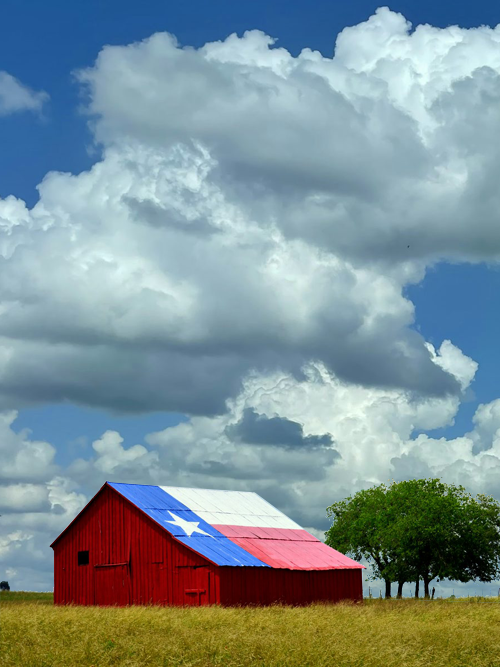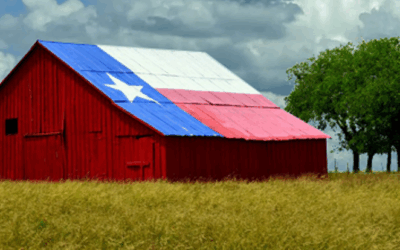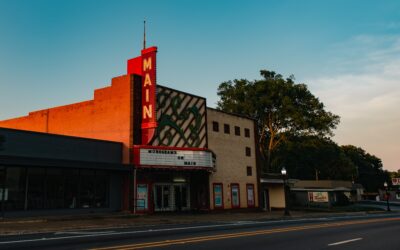Strengthening the Mental Health of Rural and Rural Border Communities
Building on community strengths and fostering community-driven solutions.This funding opportunity is now closed. Check out our open opportunities or TGRC’s statewide opportunities list.
We are requesting proposals for projects that support rural and rural border communities. This initiative will build on community strengths and foster community-driven solutions to help create, support, celebrate, and promote mental well-being.
The foundation plans to award up to ten project grants. Each grant will provide up to $75,000 annually for five years and may total up to $375,000 per grant partner, including 10 percent for overhead expenses.
Background Information

This initiative began in 2018, following the foundation’s previous strategic plan. It aimed to learn more about how to support mental health in rural area settings, address local challenges, and identify community conditions that both help and challenge mental health. The goal was to support ideas that came from within the community to create, support, and promote mentally healthy communities.
“Addressing well-being at the community level, using a public health approach may build well-being and protective factors for all. A collaborative, community-owned approach can bring together experience, networks, local knowledge, and other resources to form a locally-driven, place-based initiative that can address complex issues effectively. Research on community empowerment, coalition functioning, health interventions and the use of local data provides evidence about what can be achieved in communities. There is less understanding about how communities can collaborate to bring about change, especially for mental health and well-being.” International Journal of Mental Health Systems
Related Content
The Hogg Foundation and Partners Have Awarded $6.5 Million in Grants to Support Well-being in Rural and Rural Border Communities
The Hogg Foundation, along with two partner foundations, has awarded $6.5 million in grant funding over five years to 11 organizations to improve mental health, resilience, and well-being in rural and rural border communities. The Strengthening the Mental Health of Rural and Rural Border Communities initiative will build on community strengths and foster community-driven solutions to create, support, celebrate, and promote mental well-being.
Root-Bound or Growth Mindset?
A growth mindset is the belief that skills and abilities can be improved and that developing these is the purpose of your actions.
Community-Based Solutions: Grassroots Mental Health Innovations That Work
When it comes to supporting rural communities, especially around mental health, success often starts not with answers, but with questions—and a deep commitment to listening.
Review our FAQs and if your question is not answered, contact the Grants Management team. Additional questions related to this RFP will be added as they are received.
You must register in Fluxx by the deadline in the key dates table above be eligible to apply. We highly encourage registering early to avoid any last-minute technical issues.
Eligibility
For full eligibility requirements, see the RFP.
Can a university or government agency apply as the lead applicant? No. Colleges and universities, local mental health authorities, and other local, regional, or state agencies may serve as fiscal agents/sponsors, but they are not eligible to serve as the lead applicant or lead the project. The lead organization must be a 501(c)(3) nonprofit based in the rural or rural border community, and the project must be community-led. Before the grant is implemented, these entities must formalize their roles through a Memorandum of Understanding (MOU). Additionally, Letters of Support (LoS) must be submitted with the proposal—one from the lead organization (including signed by community members) and one from the fiscal sponsor—affirming that the community will lead and drive the project.
How should we determine if our community qualifies as rural or rural border? To qualify, your proposed project must serve a community with fewer than 50,000 people according to the 2020 U.S. Census. For rural border eligibility, the community must also be within 62.5 miles of the Texas-Mexico border. Use the U.S. Census Bureau QuickFacts tool to verify your population size.
Evaluation
How should activities and outcomes be described in the application? Applicants should propose activities and outcomes that align with the initiative goals stated in the RFP. A narrative report is due at the end of each grant period, detailing the successes and areas for improvement identified by the awardee.
How will awardees evaluate their programs? Awardees will be part of a Learning Community Cohort. Awardees receive technical assistance to support developing, implementing, and evaluating their strategic plans. Awardees will also take part in the initiative’s evaluation component. This will ensure comprehensive assessment and continuous improvement.
Review and Selection Process
Has the foundation determined how many grants will be issued? We will be making selections based on proposal quality, alignment with the Hogg Foundation’s mission and goals for this initiative, and the geographic distribution of applicants. The foundation plans to award up to $750,000 each year ($75,000 per organization per year) to multiple organizations.
How many grant partners will be selected for this project? The foundation intends to fund up to ten community projects. The final number depends on the quality of proposals received.
Why five years? Cultural change involves a significant shift in community attitudes, beliefs, and actions. This process is complex and requires a long-term view. In our experience, it takes 7-10 years to see noticeable and measurable changes. A long-term view helps communities manage systemic transformation and foster meaningful, lasting change.
Why Community Collaboratives? Community collaboratives harness the power of collective action and local knowledge to create sustainable change. Effective collaboratives also involve people who are not typically included in decision-making. Community collaboratives involve everyone to co-create solutions for their communities’ unique challenges.
Does the proposed collaboration have to be an established collaboration or network, or can it be newly formed to apply for this opportunity? The applicant may be a newly formed group with plans to establish a community collaborative. While potential grant partners do not need to have fully established collaborations at the time of application, applicants must provide three to five letters of support from prospective partners.
Why Learning Communities? Learning communities foster the sharing of knowledge, learning, strategies, and resources. Learning communities enhance and strengthen collective problem-solving and innovation capacity.
What is trust-based philanthropy? The foundation practices trust-based philanthropy because it shifts power dynamics, fosters unity, promotes self-determination and builds stronger, more resilient communities. Trust-based philanthropy emphasizes transparency, mutual respect, and long-term partnerships. This allows grant partners to focus on their mission rather than administrative burdens.
Why emphasize community members who are traditionally not involved in decision-making? Including those traditionally not involved in decision-making is crucial in community collaboratives. It ensures that the solutions developed address the needs of all community members. Engaging these groups creates a fair and comprehensive decision-making process. This is crucial for achieving lasting and impactful community improvements.
What do you mean by “established presence in a community”? A non-rural applicant may serve as the lead for a community with a population of 50,000 or fewer. Non-rural applicants must meet the following criteria for being an established presence in a community:
- They have a well-established presence in the proposed rural community. They can articulate the percentage of time they will dedicate to it.
- They have a proven history of working effectively with community members in the proposed rural area.
- They are within a reasonable geographic distance (within 100 miles) of the proposed rural community they intend to serve.
- They can commit to 100% of the grant funds (excluding overhead) being spent in the proposed rural community.
Additional Questions
Are any specific items or statements required within the Letter of Approval? The Letter of Approval should be on the applicant’s letterhead. It should state that the named entity’s lead (or authorized signatory) supports the proposal submission. The letter should also explain how this project aligns with the mission and vision of the applicant and the Hogg Foundation. There should be a statement that, if awarded, the applicant intends to partner with the Hogg Foundation in this vital effort. Sample Letters of Approval are on the Resources for Grantseekers and Grantees webpage.
What if I can’t attend the training webinars? Will those participating in the webinars have a better chance of being awarded? While the RFP is open, we are offering training webinars on writing a proposal, developing a budget, and measuring your success. Applicants can gain skills in these areas for this funding and future opportunities. We will also provide an overview of the funding opportunity, cover questions and answers about the initiative, and leave time for additional questions from potential applicants. The webinars are recorded. A link to the recording will be posted on the Strengthening the Mental Health of Rural and Rural Border Communities RFP webpage. We strongly encourage attending these webinars because the content benefits all applicants. However, you will not be penalized if you choose not to attend any or all of the webinars.
Is the 10% overhead included in the $75,000 annual grant amount? Yes. The total award is up to $75,000 per year and up to 10% of that amount may be used for overhead or indirect costs.
What can the grant funds be used for? Grant funds may be used to support a wide range of project-related expenses, including staff time to coordinate the community collaborative, trainings, events, travel, and other activities that advance the goals of the project. All expenditures should occur within the lead community and reflect a collaborative, community-led approach. Spending decisions are made by the community collaborative. Up to 10% of the total grant may be allocated for overhead costs. If a fiscal agent is involved, it is allowable for them to retain the overhead portion to support their role in assisting the lead organization.
Can funds be used to provide direct services? No.
Do I need a complete action plan before applying? No. The first 6–18 months of the grant can be used for planning and engagement. You will develop your action plan during this time with support from the Learning Community Coordinator and Evaluator Teams.
Are templates provided for the timeline and budget? Yes. Templates for both are available in the Fluxx application portal under “Application Documents” or linked from the RFP and below. Be sure to download, complete, and upload them with your proposal.
Having trouble with the budget template? Contact the Grants Management team for support.
How are grant funds distributed? The first grant year runs from December 1, 2025 to November 30, 2026; the awardee will receive the full award amount for grant period 1 or GP1 (ex: $75,000). Thereafter, approximately six weeks prior to the end of each GP, you will automatically receive a payment of half the award amount (ex: $37,500). Upon receipt and approval of the annual narrative and fiscal reports (typically due 30 days after the end of the GP or in this case December 30). Once approved, the foundation will issue a payment of the balance of that GP (ex: $37,500). The same payment process will be used throughout the grant term: December 1, 2025, to November 30, 2030.
Should we include the 10% overhead in our budget? Yes, the budget template automatically calculates the maximum of 10% overhead. Your project expenses should total approximately $67,500, with the remaining $7,500 allocated for overhead. The total annual funding request must not exceed $75,000.
What should we budget for the kickoff event? The kickoff event is a virtual, 3-hour gathering hosted by the foundation and there is no cost to participants, so you do not need to include it in your budget. See the key dates table above for the date.
What should we budget for the annual meeting? The annual meeting is typically a 2-day, in-person gathering held at a Texas grant site. We recommend budgeting for 2-3 nights of lodging and travel expenses. Each budget template includes $3,000 to support attendance for at least three people from each site (date/location TBD). This amount is intended to cover:
- Transportation (airfare/auto rental)
- Lodging, 2-3 nights hotel
- Per diem for meals while traveling (meals during the meeting are provided by the host)
For your proposal, please use the preset $3,000 allocation. Adjustments can be made once the meeting location is confirmed and actual travel costs are known.
Can the funding be used for a part-time social work internship (or for a program, treatment or specific intervention)? If you are proposing to come to a community with a solution for the community, that has not been discussed, voted on or proposed by a group of people from the community (collaborative), then that is not the spirit of the initiative. The community is to determine what they want/need, not the applicant.



